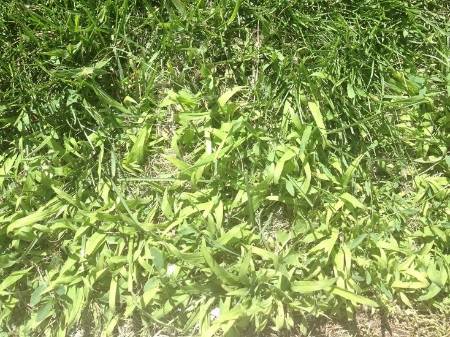Crabgrass

Crabgrass is one of the biggest weed issues that many homeowners face in their lawns. While many people have heard of crabgrass they might not actually be sure what it is and the best way to control it. Crabgrass is an annual grassy weed that can crowd out more desirable and aesthetically pleasing grasses. This weed typically grows in ungainly clumps, has a rolled stem and lime green coarse textured leaves. It typically has a prostrate form of growth and spreads out along the ground. You can see the difference in the grasses to the right. The Crabgrass is on the bottom.
The best way to prevent crab grass and any weed is to have a healthy, thick stand of turfgrass that can out compete the less desirable plants. Fertilizing the lawn at the correct time, watering when necessary and mowing at the correct height with a sharp blade will reduce the number of weeds you have. If you do have crabgrass the best way to control it is to apply a pre-emergent herbicide that prevents the crabgrass from germinating.
Timing of application is very important. If you apply it too early the pre-emergent could run out of efficacy before the crabgrass stops germinating later in the season, if you apply it too late the pre-emergent doesn’t have any effect on the crabgrass that has already germinated. The ideal time to apply crabgrass preventer is when the red bud trees are in full bloom which typically is about April 15th as that gives the chemical time to disperse into the ground. Most pre-emergent herbicides will need a second application after they have worn off unless you buy a product such as Barricade or Dimension that provide season long control. Since crabgrass seeds are viable in the soil for several years this can be a long-term fight but you can eventually win the battle.

